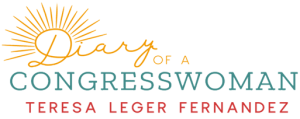Mary-Charlotte Domandi:
I recently read a biography of Lyndon Johnson and it was very interesting. I’ve been reading presidential biographies lately, and I was struck by this passage where he wrote that when he was in Congress, he was talking about how foreign policy was not the domain of Congress, it was the job of the executive branch. And then when he became president, he engaged in this war in Vietnam that he shielded from Congress as much as he could, and it ended up really being his political downfall. You and I haven’t talked that much about foreign policy during this series. And it seems to me that for a number of reasons, Americans, aren’t really looking outward as much as they may be have in other decades. I’ve gotten a few questions from listeners about foreign policy, and I was just wondering about how you as a congressperson are thinking about your role and Congress’s role in shaping or responding to us foreign policy.
Teresa Leger Fernandez:
So that’s a very interesting question because indeed foreign policy is the purview of Congress, the same way that basically anything the federal government does—we fund the state department, we fund USAID, and we write the laws that impact what we do with regards to foreign policy. And while it is not my area of expertise, I will be called upon to have votes on the floor regarding foreign policy. And that might range from what we do with the War Powers Act and the fact that it needs updating and restricting and making it very clear in the end, what should we put in the package and what votes we do with regards to—there is money right now in the American Rescue Plan, which includes money that will help foreign policy. There is money that we will be allocating for addressing the root causes of migration in the Northern Triangle.
That is very much foreign policy that has a direct domestic impact. So while this is not my area of expertise in Congress—I do not sit on the foreign affairs committee—we all have to be concerned about and aware of what are we doing nationally. And what I like that we are doing right now is being aware that Congress needs to an in a sense take back its power. And in many ways, Congress has got to let the presidents do whatever they want. And we saw the disastrous outcome of that with President Trump. And so we need to take back the congressional power and say, no, you can’t really go into wars. And it wasn’t only Trump. That War Powers Act has been abused, and we need to bring it back and say, no, you have to talk to Congress when you’re going to engage us and something that is akin to war.
So think that that’s the balance there. It won’t be something I am incredibly incredibly involved in, but it will be something I must be aware of, and things come up we’ll learn the general contours of with regards to foreign politics. And those are two examples. What we do in Latin America impacts who we see at our borders. What we do and addressing the climate crisis will impact what we see at our borders, because we will, if we don’t address the climate crisis, there will be incredible migration and disruption. There already is the beginning of that. So those are, you know, everything is linked. So if you realize that everything is linked in the planet, we must be aware of foreign policy issues,
MCD:
I think of places like Myanmar that are going through this absolutely bloody horror show right now. And I wonder, I mean, the people of Myanmar are not coming to our borders. It’s not like a Latin American situation. And it’s something that the United States could theoretically ignore, but the moral crisis is so huge. And I’ve always wondered like when there’s this huge moral crisis, but it doesn’t directly affect “American interests,” how do we think about that as citizens, as, as Congress, as a country?
TLF:
The country, I think goes back and forth between when it believes it must be aware of what’s happening countries in an essence have our morals and our values are democratic values as a guide to how we act. You know, there is a pendulum that swings back and forth. The pendulum under Trump was we’re America first, and we don’t care about the world. In others it’s been better. In Obama you had Samantha Powers playing a key role in that administration and her book, dealing with the United States refuse to engage when there were other atrocities going on, really influenced how she thought that we needed to be more engaged in the world. You know, what happens is when we don’t hold up democratic values ourselves and we’re engaged in voter suppression efforts, it undermines our ability to say, this is what Democracy should look like. So we have to apply our values to ourselves first and then try to say they should be applied elsewhere.
But I do think that we are probably entering into a phase with this presidency who is more aware of the role we should play in the world. And I think you see a little bit of that. But if you’re talking about biographies, if you read the biography about Nancy Pelosi, when she first got to Congress, one, she immediately began advocating for AIDS funding and for addressing the AIDS crisis. But she also played a key role in trying to push a different kind of response from Congress with regards to Tiananmen Square. So Congress and individual Congresspeople do take on these issues and play a big role on an international level. And I think that that is important. Right now we are seeing that one of the members of the congressional Hispanic caucus who really rallies for the need to call out corruption and to not fund corruption—when we try to say let’s address the root cause of migration and the Northern triangle—she is being singled out by the president of Honduras because he doesn’t want Congresspeople calling them out on their corruption.
So it happens, and we, as the Congressional Hispanic caucus are standing up and saying, no, what she is doing is right. And it’s important that we stand up and that we denounce a president who’s willing to target a member of Congress who is saying corruption is something that is causing the flow.
So anyway, that’s, that’s a range of things, but I do think that there is a role, there is an important role. Congress must play, and you’re going to see Congress taking back its power as it were.


